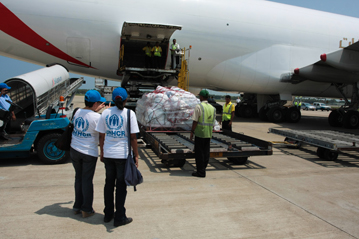Time for Chad to repay past kindness, President tells Lubbers
Time for Chad to repay past kindness, President tells Lubbers

ABECHE, Chad, March 2 (UNHCR) - UN refugee agency chief Ruud Lubbers has started his three-day visit to Chad by reiterating his commitment to helping 110,000 Sudanese refugees in the east despite daunting challenges.
Arriving on Tuesday morning in Abéché, the main city in eastern Chad, the High Commissioner met with Chadian President Idriss Deby to discuss the situation of 110,000 Sudanese refugees in the east and 33,000 Central African refugees in the south.
Lubbers then flew to Farchana camp, 55 km from the Chad-Sudan border and home to 2,100 relocated Sudanese refugees. With women and girls on one side, and men on the other, the refugees called out traditional greetings, sang and clapped. The High Commissioner shook hands with many of them, and raised both hands in the air to acknowledge their warm welcome.
Meeting with refugee leaders and representatives of non-governmental organisations (NGOs) working in Farchana camp, Lubbers said, "President Deby told me there was a time when the whole world took care of refugees from Chad. It's time to repay this by taking care of the people who have come from Darfur to Chad. He asked me to continue to work in partnership with others to take care of them. It's certainly not easy. In fact it's very difficult."
He explained, "A High Commissioner for Refugees does not have an army. I cannot force any solutions. I am here to help, with my colleagues, with the other organisations of the UN, and with the NGOs."
"I cannot speak Arabic but I understand your problems, especially the problems of the women and children," said Lubbers, who spoke in French and communicated with the refugees through a translator.
One of the things he noticed when he toured the camp was that it needed to be expanded and that other sites must be found. "We are under time pressure because of the rainy season that is coming," he said.
Noting the hospitality of the Chadian community, Lubbers said, "There's a very interesting contrast here. On one side, there is the drama of violence in Darfur. On the other side, there is the solidarity between the refugees and the people of Chad."
He told the refugees, "I hope you'll live here in harmony, but for a limited time. And then at a certain moment, it will be possible for you to go home."
The High Commissioner flew back to Abéché after the meeting. On Thursday, he is scheduled to meet the French ambassador in the Chadian capital, N'Djamena, before visiting another transit site at Touloum, which currently houses 4,800 Sudanese refugees.
In all, more than 7,700 refugees have so far been relocated from the insecure border area to three inland camps - Farchana, Touloum and Kounoungo. UNHCR and its partners are working to expand the existing sites and to develop others to move as many of the 110,000 refugees to safety before the rainy season starts in May.
The refugee agency is also continuing emergency airlifts of relief supplies. Since mid-February, it has delivered 511 tons of items like tents, blankets and plastic sheeting in ongoing airlifts from Tanzania and Pakistan.









